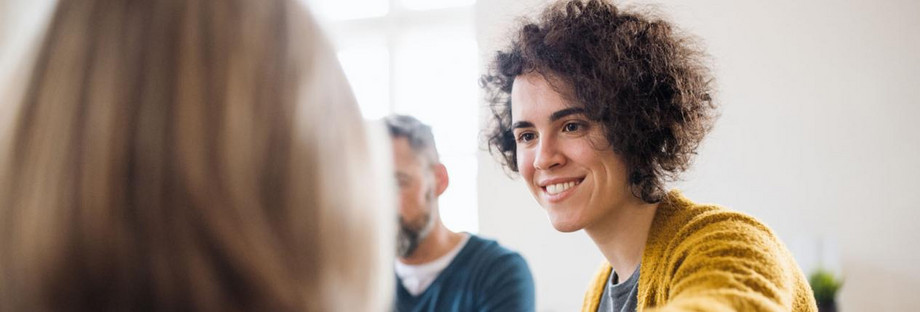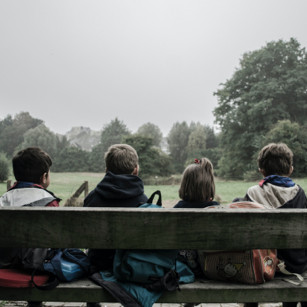Mission mental health: Seven projects receive grants

23.05.2023 l More news
VELUX FONDEN supports the development of new initiatives that focus on preventing and reducing mental health problems. This year, seven projects will receive a total of DKK 27.9 million to develop and test new methods that can give people with mental health problems the opportunity to participate actively in social communities in order to improve their mental well-being.
According to the Danish Health Authority’s latest national health profile survey (”Danskernes sundhed – Den nationale sundhedsprofil 2021”) one in six Danes over the age of 16 suffers from poor mental health. That corresponds to roughly 839,000 people – and young people are the worst affected. From 2017 to 2021, the proportion of Danes with poor mental health increased from 13.2 to 17.4 per cent.
VELUX FONDEN has for many years supported the development of new initiatives in civil society aimed at improving mental health. In 2022, the aim was expanded to include the development of methods for supporting the collaboration between initiatives in civil society and in the municipalities/regions. Under the ‘Mental health’ open call, seven projects (see the projects) received grants in the autumn to bridge the gap between initiatives and create communities and activities that promote well-being and mental health. The interest in the call and the need for initiatives was so great that a follow-up open call was launched under the heading ‘Mental well-being’. A further seven projects are now receiving grants:
“We want to help provide civil society and public initiatives with new knowledge and insight that can qualify the efforts for people with mental health problems. The seven selected projects contribute to the development of the social services as well as that of the individual. We look forward to following the projects’ important work in helping young people and adults with mental health problem become part of everyday communities. As we go about our daily lives, feeling part of a community is empowering and prevents people from feeling excluded, thus strengthening social cohesion and sustainability,” says Head of Programme Vibeke Lybecker from the grant programme for social initiatives.
Experience experts and evaluation make us wiser
Social initiatives
Read more about VELUX FONDEN’s grant programme for social initiatives.
To ensure that the projects make sense to the users, VELUX FONDEN has been assisted by ten people with first-hand experience of mental illness and other mental health issues. The experience experts helped formulate the open call and were involved in the initial selection of the expressions of interest that were granted funding and invited to write a full application.
To find out how the initiatives are working, the foundation is initiating a cross-disciplinary evaluation of the projects.
- When civil society builds bridges
Undertaken by the association ‘Børn og Unges Trivsel’. The project is organised as a close co-creative partnership in a working group with employees from the municipalities, OPUS Young, The Intersectoral Prevention Laboratory, Børn og Unges Trivsel, Implement and young people in the target group.
Grant: DKK 4.949.232
More and more young people are struggling with mental health challenges and poor mental health to such an extent that it prevents them from realising their dreams of leading happy and independent lives as young people and adults. The aim of the project is to build on experiences in ensuring a holistic aftercare service for young people between the ages of 15-25 who are in the final phase of or have been part of an OPUS Young programme. These young people often struggle with multiple challenges such as self-harm, eating disorders, anxiety and loneliness.
Through an interdisciplinary mastery course covering self-esteem training and competence development, the young people learn to navigate everyday life. A team of psychologists, social workers, yoga/mindfulness instructors, nature, art and creativity therapists, as well as core volunteers will work together to facilitate the positive development of the young person.

– Digital psychiatry in civil society communities
Undertaken by YMCA’s Social Work in collaboration with Center for Digital Psychiatry as well as the Region of Southern Denmark, Central Denmark Region and North Denmark Region.
Grant: DKK 4.600.000
Many citizens with mental health problems are facing social and geographical challenges both during and after psychiatric treatment. The aim of the project is to develop a method for providing users of the YMCA’s Social Work cafés with flexible and specially tailored support and treatment via a digital service. Using digital solutions, the project aims to ensure that access to treatment becomes less dependent on geography and the citizens’ own resources (mobility).
The goal is for citizens to experience increased involvement and for this to help increase their well-being, life mastery and control of their own course of treatment so that patient satisfaction is improved and relapse is prevented.
Undertaken by Samsø’s Culture, Sports and Volunteer Centre, SamBiosen, in collaboration with the Support Team in the Social, Health and Employment Administration in Samsø Municipality.
Grant: DKK 1.812.100
Mentally vulnerable people on Samsø feel that it is not easy to become part of new communities. The project will develop methods for helping people with mental health problems on Samsø become part of active and meaningful leisure communities. Activities will focus, among other things, on personal training, training in small groups, nature-based training and communal dining, all of which are activities in which the target group has expressed a specific interest, as well as offering a companion scheme for members of the target group.
The project is based on insights gained in connection with citizen involvement in the making of the municipality’s new health policy and will strengthen the collaboration between Samsø Municipality and civil society organisations on the island. Today, there are no association activities for people in poor mental health on Samsø.
Undertaken by the Mændenes Hjem hostel in collaboration with the City of Copenhagen
Grant: DKK 3.931.500
The purpose of the project is to strengthen the mental well-being of vulnerable and marginalised citizens through increased access to working communities in society. Since 2019, under a social tax exemption scheme, socially vulnerable people have been able to earn up to DKK 20,000 tax-free per year without deductions being made from their social benefits. Based on close collaboration between the City of Copenhagen and the Mændenes Hjem hostel, the goal is to anchor and roll out the social tax exemption scheme more broadly in the City of Copenhagen, enabling more citizens to make use of the scheme to boost their quality of life and well-being.
– Nature guides build bridges between municipality and associations
Undertaken by Nature Interpretation Denmark in collaboration with the municipal nature guides, municipal services such as the Pedagogical Psychological Counselling Services (PPR) and clubs and associations in the four municipalities.
Grant: DKK 3.518.445
Studies from, among others, the Danish Centre for Youth Research, point to a number of qualities that young people themselves associate with nature-based activities and nature-integrating social initiatives: sense of community, finding peace, learning new things, daring to try new things and the opportunity to show what you are capable of.
The aim of the project is to develop nature-based social care or support methods using nature as a community-building tool that can promote well-being, empowerment, cohesion and the development of social skills among young people with mental health issues. The project is carried out in four municipalities: Furesø, Vesthimmerland, Esbjerg and Odense. Possible activities include nature restoration, guided tours, animal husbandry etc. In addition, the project will build bridges between municipal initiatives for young people suffering from mental health issues and local nature and outdoor associations. A method of cooperation must be developed in the municipalities whereby resources in the field of nature-based activities, voluntary associations and pedagogical efforts are combined for the benefit of the young people in the target group.
– The bicycle as a tool for improved mental well-being
Undertaken by the Danish Cyclists’ Federation in collaboration with the national association of drop-in centres ‘Landsforeningen af Væresteder’.
Grant: DKK 3.877.200
Regular physical activity like cycling makes a difference to both physical and mental health. As we go about our daily lives, cycling more can help to create the mental surplus needed to connect with everyday life. The aim of the project is to develop a model for cycling as a community-building activity for adults with mental health problems who visit drop-in centres.
The goal is for more people living with mental challenges to go on regular bike rides, experience the bicycle as a means of transportation, have a good time and find new energy for everyday living. The long-term goal is to increase the role played by cycling and cycling in green areas as part of the psychiatric services in Danish cities.
The project builds on experience gained from previous cycling projects in addressing mental health issues, which have shown positive effects from participating in voluntary nature-based communities.
– New ways of building communities together
Undertaken by Frivilligcenter Rebild in collaboration with Rebild Municipality (Centre Family and Disability, Centre Labour Market and Citizens’ Service and Centre Health, Culture and Leisure) and a number of local associations, independent institutions and others.
Grant: DKK 5.192.092
In Rebild Municipality, the number of young people with poor mental health is increasing and has almost doubled since 2013. The aim of the project is to develop and test a new cross-sectoral collaboration between civil society, the municipality, the region and the business community with a view to recruiting and matching young people aged 13-30 who experience loneliness and are challenged by mental health issues with existing or new voluntary communities, either as participants or as volunteers. This includes supporting local associations in rethinking existing community-building activities to include more people with mental health issues. The project covers rural and urban areas in Rebild Municipality, and the idea is for the experience and method to subsequently be shared with the rest of the country.